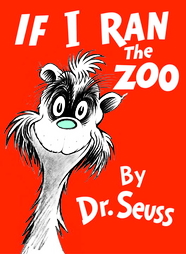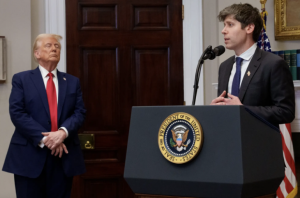One Fish Two Fish Red … Flag? Six Dr. Seuss books are being pulled from shelves, leading some to wonder if this is the best move

Photo from Wikipedia, property of Dr. Seuss Enterprises and Penguin Random House
Six Dr. Seuss books are under fire due to the controversial and racist illustrations.
March 13, 2021
American culture and history is decorated in many racist ideals and acts. It comes as no surprise that even some of our favorite children’s stories have images and depictions that are considered racist, but were normalized in the past.
Theodor Seuss Geisel, more popularly known as Dr. Seuss, has recently been put under fire for six of his books having illustrations and characters that are considered controversial and racist. These titles include: “And to Think I Saw It on Mulberry Street,” “If I Ran the Zoo,” “McElligot’s Pool,” “On Beyond Zebra!,” “Scrambled Eggs Super!” and “The Cat’s Quizzer.”
Some prominent examples of racism were in the books “If I Ran the Zoo,” which had two shirtless African characters resembling monkeys, and “And to Think I Saw It on Mulberry Street,” where there was an Asian character carrying a bowl of rice with chopsticks, having only lines in place of drawn out eyes.
Additionally, the Asian character had been initially called the “Chinaman,” however, due to earlier controversy, it was eventually changed to “a Chinese Man.” Regardless of the change in wording, the illustrations paired with the character were enough to be considered offensive.
The controversy lies within whether or not it is the correct decision to discontinue the marketing and sales of these six books or not. Since Dr. Seuss is a classic children’s author, people are discussing whether or not this matter is being handled the best way possible or if it should be handled at all.
One potential alternative to discontinuing the sales of these titles could include reprinting the books and adding disclaimers, pointing out the errors and racism. This could be turned into a learning opportunity for children.
The racism that existed during the time period Dr. Seuss wrote these books should not be ignored, and although Dr. Seuss may not have been an absurdly racist or bad person, he did have misguided views on race.
Since these books remain to be classics, a simple disclaimer could be added to the books, having an asterisk to point out the racism and the way in which it is an incorrect viewpoint, even for its time. This way, the issue doesn’t get swept under the rug, and the racism would be acknowledged instead of pretending it never occurred. The disclaimer can be turned into a lesson for children and other impressionable readers.
On the other hand, others have found that this issue has been prominent for years and not just in Dr. Seuss’ books. Therefore, many have found the discontinuation of these books to be unnecessary and fueled by “cancel culture.”
Although there is some sense behind this thought, pointing out racist aspects in classic novels and media is a powerful way in which to begin the undoing process of racism in this nation.
Racism has grown into a large part of the American thought process, so much so that there is a lot of internalized racism in everyday media. It is vital to begin the undoing of this thought process by pointing out the subtle notes from which racist thoughts stem.
To begin teaching impressionable minds to think critically, adding a disclaimer to children’s classics could more effectively promote the idea of reflecting on the media we consume and the ways in which it can harm others. Hopefully, this could cause a wave of generational change in a move toward a less racist society.
Carolyn Cheng is a graphic design intern for The Cougar Chronicle. She is currently a third year student at CSUSM and is majoring in arts and technology with a double minor in video/film production and film studies. Post graduation, Carolyn hopes to pursue a career in film or video game editing. In her free time, she enjoys watching Survivor, playing tabletop rpgs, and playing video games.





